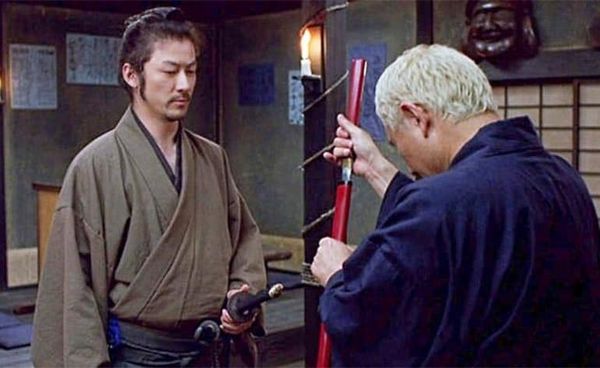Eye For Film >> Movies >> Zatoichi (2003) Film Review
Zatoichi
Reviewed by: Angus Wolfe Murray

The concept of the blind warrior is difficult to wrap your head around. As with a one-legged swimmer who wins an Olympic gold, you take a handful of salt and hurl it into the face of reason. Magic realism is more magic than real, although Zatoichi is neither.
He has become a tradition in Japanese folklore, the warrior/masseur/gambler who wanders alone from town to village, through wild inhospitable country, fighting off thieves and restoring peace to troubled communities.

Takeshi Kitano's film is so beautifully made that the violence appears aesthetically pleasing. The glory of the samurai sword, vulgarised to the point of farce in Tarantino's Kill Bill, is treated with respect, even awe. The craft of kung-fu fighting comes later. This is swordplay, not in the style of Caribbean pirates, but fast, unflinching and instantaneously lethal.
With his peroxide head bowed, eyes closed, the old man feels his way forward, bandy legs shuffling, shoulders stooped, senses bat sharp, as keen as razor wire. He may look like a dead man walking, but when he takes on a bunch of murderous bandits, intent on his demise, he makes Daredevil look disabled.
The storyline twists into knots and at times is difficult to unravel. Zatoichi arrives in a village, where he is put up by a kindly widow. On the streets, local gangs pressurise storekeepers to pay protection money on a daily, rather than weekly, basis. An inability to comply is met with deadly force.
Meanwhile, one of the criminal bosses hires a bodyguard whose talent as an assassin matches his intense dedication to the art of swordsmanship. Also, somewhere else, a maverick samurai is spilling blood to hone his skills for the inevitable showdown, while two geishas, sister and brother - there is no shyness about cross dressing - plan retribution for the slaying of their parents.
Kitano, who plays the blind warrior with extrordinary finesse and authority, manages to create a feeling for the period, without laying on ritual celebrations, or eleborate costume changes. The age of private armies and dynastic crime families has overtaken the romantic myth of the samurai protector.
Zatoichi is a figment of the vengeful angel.
Reviewed on: 18 Mar 2004



















